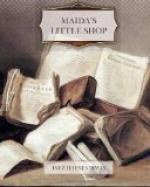But although the W.M.N.T.’s worked very hard, you must not suppose that they left no time to play. Indeed, the weather was so fine that it was hard to stay in the house. The beautiful Indian summer had come and each new day dawned more perfect than the last. The trees had become so gorgeous that it was as if the streets were lined with burning torches. Whenever a breeze came, they seemed to flicker and flame and flare. Maida and Rosie used to shuffle along the gutters gathering pocketsful of glossy horse-chestnuts and handfuls of gorgeous leaves.
Sometimes it seemed to Maida that she did not need to play, that there was fun enough in just being out-of-doors. But she did play a great deal for she was well enough to join in all the fun now and it seemed to her that she never could get enough of any one game.
She would play house and paper-dolls and ring-games with the little children in the morning when the older ones were in school. She would play jackstones with the bigger girls in the afternoon. She would play running games with the crowd of girls and boys, of whom the W.M.N.T.’s were the leaders, towards night. Then sometimes she would grumble to Granny because the days were so short.
Of all the games, Hoist-the-Sail was her favorite. She often served as captain on her side. But whether she called or awaited the cry, “Liberty poles are bending—hoist the sail!” a thrill ran through her that made her blood dance.
“It’s no use in talking, Granny,” Maida said joyfully one day. “My leg is getting stronger. I jumped twenty jumps to-day without stopping.”
After that her progress was rapid. She learned to jump in the rope with Rosie.
They were a pretty sight. People passing often gave them more than one glance—Rosie so vivid and sparkling, in the scarlet cape and hat all velvety jet-blacks, satiny olives and brilliant crimsons—Maida slim, delicate, fairy-like in her long squirrel-coat and cap, her airy ringlets streaming in the breeze and the eyes that had once been so wistful now shining with happiness.
“Do you know what you look like, Maida?” Rosie said once. Before Maida could answer, she went on. “You look like that little mermaid princess in Anderson’s fairy tales—the one who had to suffer so to get legs like mortals.”
“Do I?” Maida laughed. “Now isn’t it strange I have always thought that you look like somebody in a fairy tale, too. You’re like Rose-Red in ‘Rose-Red and Snow-White.’ I think,” she added, flushing, for she was a little afraid that it was not polite to say things like this, “that you are the beautifulest girl I ever saw.”
“Why, that’s just what I think of you,” Rosie said in surprise.
“I just love black hair,” Maida said.
“And I just adore golden hair,” Rosie said. “Now, isn’t that strange?”
“I guess,” Maida announced after a moment of thought, “people like what they haven’t got.”




